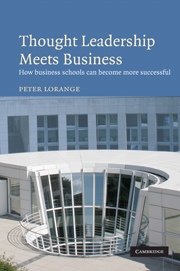Book contents
- Frontmatter
- Contents
- List of figures
- List of tables
- Foreword
- Preface
- 1 Background and conceptual framework
- 2 Key academic programs and academic value-creation
- 3 The critical role of R&D
- 4 Marketing strategy
- 5 Institutional learning
- 6 Human resources strategy
- 7 The learning partner perspective
- 8 Business school leadership issues
- 9 Conclusion: So, what are the key success factors?
- Appendix I
- Appendix II: core references
- Index
7 - The learning partner perspective
Published online by Cambridge University Press: 22 September 2009
- Frontmatter
- Contents
- List of figures
- List of tables
- Foreword
- Preface
- 1 Background and conceptual framework
- 2 Key academic programs and academic value-creation
- 3 The critical role of R&D
- 4 Marketing strategy
- 5 Institutional learning
- 6 Human resources strategy
- 7 The learning partner perspective
- 8 Business school leadership issues
- 9 Conclusion: So, what are the key success factors?
- Appendix I
- Appendix II: core references
- Index
Summary
A moment's insight is sometimes worth a lifetime's experience.
Oliver Wendell Holmes, Jr., Associate Justice, US Supreme Court, 1902–32
KEY POINTS
It is vital for the CEO, senior management and a broad set of executives to act as catalysts to stimulate a learning culture and disseminate this culture broadly within the firm. Since most CEOs will be pushing their strategic change agendas, they will typically need to draw on executive learning to bring the executive cadres along so that they can effectively implement the new strategic directions. Thus, the creation of a learning culture would be a key item on the CEO's agenda.
The HR function typically plays an important role in supporting the CEO and senior management. Apart from the obvious responsibility of hiring and developing new talent – perhaps through executive education programs – HR may also be responsible for implementing the mandate from top management for a strengthened corporate culture.
The new role of chief learning officer (CLO) is increasingly being created as a specific, separate function to underscore the importance of lifelong learning and to ensure that learning tasks are not underemphasized because of HR's other pressing activities. In particular, the CLO may be involved in developing tailored programs that will support the implementation of new strategic shifts mandated by senior management. Often the CLO is responsible for the “corporate university” in a firm.
- Type
- Chapter
- Information
- Thought Leadership Meets BusinessHow business schools can become more successful, pp. 162 - 181Publisher: Cambridge University PressPrint publication year: 2008



